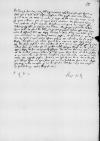Non possum iterum non hortari Reverendissimam Dominationem Vestram, ut
tres(?) in aula s(erenissimae) or s(acrae)⌈s(erenissimae)s(erenissimae) or s(acrae)⌉
⌊regiae maiestatis⌋ rem ita curet, ne alii quam quos indicavi, per s(erenissimam) or s(acram)⌈s(erenissimam)s(erenissimam) or s(acram)⌉ regiam maiestatem nominentur, de
gloria(tio)ne or glori(fic)a(tio)ne⌈gloria(tio)negloria(tio)ne or glori(fic)a(tio)ne⌉
hominum non habendo aliquem respectum. Existimo autem, quod ex ea nominatione plus dedecoris quam gloriae, si sapierint, sint laturi. De prorogatione facienda videbit Reverendissima Dominatio Vestra ex formula litterarum s(erenissimae) or s(acrae)⌈s(erenissimae)s(erenissimae) or s(acrae)⌉ ⌊regiae maiestatis⌋ scriptarum. Melius esset, ne si regia maiestas ad constitutum diem XX Septembris nominatos mitteret. Alioqui non video, quomodo ante conventionem in ⌊Grudentz⌋ venire possim ad Reverendissimam Dominationem Vestram, quae utique haec etiam apud s(erenissimam) or s(acram)⌈s(erenissimam)s(erenissimam) or s(acram)⌉ ⌊regiam maiestatem⌋ efficere poterit, ut cubicularius hic sit XIX Septembris. Hoc praeterea nolo celare Reverendissimam Dominationem Vestram nos ante XXV Septembris etiam si XX die fieret postulatio, hinc recedere ad Dominationem Vestram Reverendissimam non posse propter quandam arduam causam, quae nobis est cum quodam nobili ⌊Georgio Sack⌋, cui venerabile capitulum XXIIII Septembris ad hic comparendum praefixit. De itinere Romano optimum foret, ut de multis interim saltem per litteras ageret Reverendissima Dominatio Vestra cum venerabili domino custode et an nonnulla mihi ad iter necessaria sint ordinanda, ita ut in medio Octobris iter aggredi possim. Interim me gratiae Reverendissimae Dominationis Vestrae unice commendo, quam obnixe precor, ne aegro ferat animo me non valedicta Reverendissima Dominatione Vestra abisse, quod utique nullo contemptu per me admissum fuit. Sed haec melius coram.


 AAWO, AB, D.5, f. 50v
AAWO, AB, D.5, f. 50v